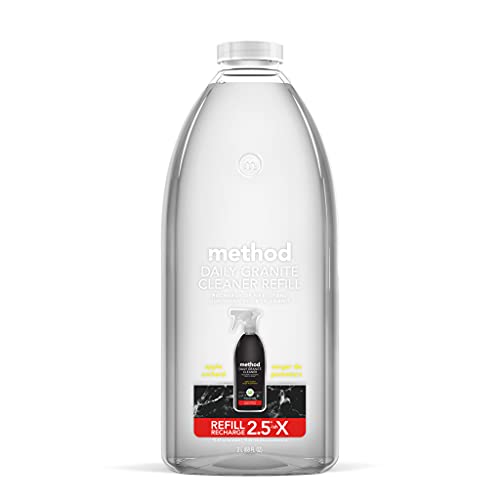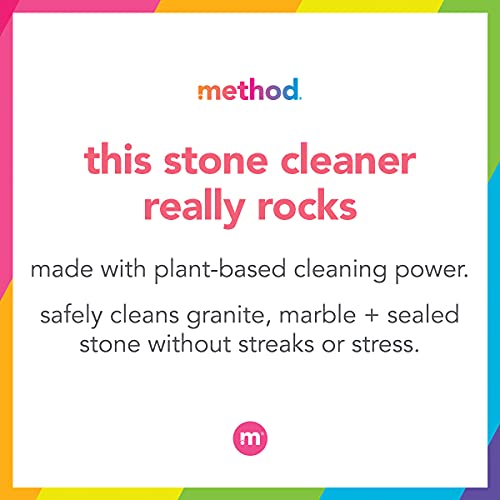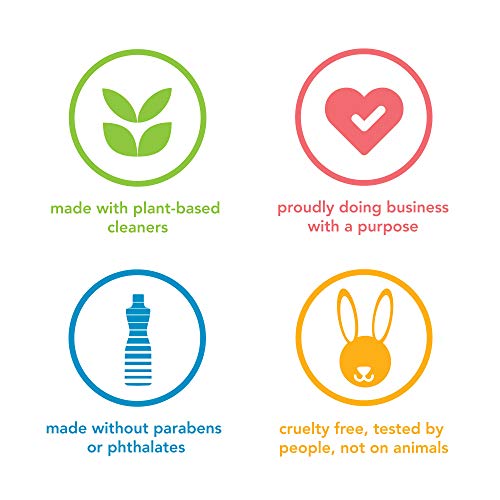






Method Daily Granite Cleaner Refill - Plant-Based, Streak-Free Clean, Apple Orchard Scent - 68oz


Methylisothiazolinone
High RiskMethylisothiazolinone is a widely-used preservative in cosmetic and personal care products, known for its antimicrobial properties. It helps prevent the growth of bacteria and fungi, extending the shelf life of formulations. It is often used in leave-on and rinse-off products, including lotions and shampoos.
Sustai Insights
Methylisothiazolinone serves as an effective preservative, combating microbial growth in various personal care items. However, it is associated with a high risk of allergic reactions and skin sensitization, especially in individuals exposed repeatedly. Regulatory bodies have imposed use restrictions due to these health concerns. Additionally, while it is not considered a carcinogen, its environmental impact includes potential pollutant characteristics. Overall, the risk associated with methylisothiazolinone is high, prompting caution and consideration of safer alternatives.
Linalool
High RiskLinalool is a terpene commonly found in various plants, particularly in lavender and mint. It is primarily used in products for its fragrance and potential antimicrobial properties. Linalool is also utilized in formulations for its ability to enhance the sensory experience of personal care and household products.
Sustai Insights
Linalool offers functional benefits as a naturally occurring fragrance component and may exhibit antimicrobial properties. However, it presents high allergenic potential, with concerns about skin irritation and sensitization. Environmental risks include contamination issues, though it is not classified as a persistent pollutant. Regulatory bodies have noted the need for careful handling due to its allergenic nature. Overall, despite some beneficial attributes, the ingredient carries a high risk profile, warranting cautious use and consideration of safer alternatives.
Limonene
Medium RiskLimonene is a scent ingredient and solvent naturally found in citrus fruits, commonly used in personal care and cleaning products for its fragrant properties. It serves as a flavoring agent and enhances the overall sensory experience of products.
Sustai Insights
Limonene offers functional benefits such as acting as a solvent and fragrance enhancer. However, it carries a high allergenic potential, which can trigger skin or respiratory sensitivities in some individuals. Environmental concerns include moderate persistence and bioaccumulation, along with potential ecotoxicity. Regulatory restrictions necessitate verification in products containing this ingredient. Overall, the risk level is assessed as medium, emphasizing the importance of cautious use, particularly for sensitive populations. Safer alternatives may be considered to mitigate these risks.
Sodium Citrate
Low RiskSodium citrate is used in cosmetic formulations primarily as a buffering agent, helping to stabilize pH levels. It is derived from citric acid and is commonly found in various personal care products to enhance their efficacy and stability.
Sustai Insights
Sodium citrate offers functional benefits such as effective pH regulation and acts as a mild preservative. It is generally recognized as safe with low risks for cancer, allergies, and reproductive toxicity. Environmental concerns are minimal, with no significant pollutant potential or bioaccumulation. Regulatory bodies like the FDA and COSMOS have no major restrictions on its use. Overall, sodium citrate presents a low risk, making it a viable ingredient in cosmetic formulations. Safe usage practices should be followed, and alternatives are not typically necessary.
Peg 55
Low RiskPEG-55 is a polymer of ethylene oxide commonly used as a surfactant and emulsifier in cosmetic and personal care products. It helps to improve the texture and stability of formulations by aiding in the mixing of oil and water-based ingredients.
Sustai Insights
PEG-55 offers functional benefits as an effective emulsifier, enhancing product performance. It has a low risk of health concerns, including carcinogenicity, allergies, and reproductive toxicity, and is not associated with significant environmental hazards. Regulatory bodies have not imposed serious restrictions on its use. Overall, it presents a low risk, making it a viable ingredient in formulations. Safe usage practices should be followed, and alternatives like plant-based emulsifiers may be considered for increased sustainability.
Water
Low RiskWater is a clear, colorless liquid essential for various biological processes. It serves as a solvent in formulations, facilitating the dissolution of other ingredients and enhancing product texture and application. Additionally, water plays a crucial role in hydration and is a key component in many cosmetic and personal care products.
Sustai Insights
Water is an effective solvent and hydrator, contributing to the texture and efficacy of formulations. It is biodegradable and generally regarded as safe, with low concerns regarding carcinogenicity, allergies, and reproductive toxicity. However, excessive water usage can lead to environmental concerns, particularly regarding resource depletion. Regulatory bodies do not impose restrictions on water use in cosmetics. Overall, the risks associated with water are low, making it a safe and essential ingredient.
Sd Alcohol 38 B
Low RiskSpecially denatured (SD) alcohol 38 B is a mixture of ethanol and specific denaturants designed to prevent ingestion while retaining its properties for use in cosmetics and personal care products. It serves as a solvent and can also enhance the absorption of other ingredients.
Sustai Insights
SD alcohol 38 B functions effectively as a solvent and can improve product stability and absorption. It is typically considered low risk for carcinogenicity, allergens, and non-reproductive organ system toxicity. However, potential irritation and moderate risks to developmental and reproductive health have been noted. Environmental concerns include its pollutant potential, although it is not bioaccumulative. Regulatory bodies do not impose significant restrictions on its use. Overall, the ingredient is assessed as low risk, and users should observe safe usage practices. Alternatives include plant-based alcohols or other non-toxic solvents.
Sodium Citrate
Low RiskSodium citrate is used in cosmetic formulations primarily as a buffering agent, helping to stabilize pH levels. It is derived from citric acid and is commonly found in various personal care products to enhance their efficacy and stability.
Sustai Insights
Sodium citrate offers functional benefits such as effective pH regulation and acts as a mild preservative. It is generally recognized as safe with low risks for cancer, allergies, and reproductive toxicity. Environmental concerns are minimal, with no significant pollutant potential or bioaccumulation. Regulatory bodies like the FDA and COSMOS have no major restrictions on its use. Overall, sodium citrate presents a low risk, making it a viable ingredient in cosmetic formulations. Safe usage practices should be followed, and alternatives are not typically necessary.
Methylisothiazolinone
High RiskMethylisothiazolinone is a widely-used preservative in cosmetic and personal care products, known for its antimicrobial properties. It helps prevent the growth of bacteria and fungi, extending the shelf life of formulations. It is often used in leave-on and rinse-off products, including lotions and shampoos.
Sustai Insights
Methylisothiazolinone serves as an effective preservative, combating microbial growth in various personal care items. However, it is associated with a high risk of allergic reactions and skin sensitization, especially in individuals exposed repeatedly. Regulatory bodies have imposed use restrictions due to these health concerns. Additionally, while it is not considered a carcinogen, its environmental impact includes potential pollutant characteristics. Overall, the risk associated with methylisothiazolinone is high, prompting caution and consideration of safer alternatives.
Linalool
High RiskLinalool is a terpene commonly found in various plants, particularly in lavender and mint. It is primarily used in products for its fragrance and potential antimicrobial properties. Linalool is also utilized in formulations for its ability to enhance the sensory experience of personal care and household products.
Sustai Insights
Linalool offers functional benefits as a naturally occurring fragrance component and may exhibit antimicrobial properties. However, it presents high allergenic potential, with concerns about skin irritation and sensitization. Environmental risks include contamination issues, though it is not classified as a persistent pollutant. Regulatory bodies have noted the need for careful handling due to its allergenic nature. Overall, despite some beneficial attributes, the ingredient carries a high risk profile, warranting cautious use and consideration of safer alternatives.
Peg 55
Low RiskPEG-55 is a polymer of ethylene oxide commonly used as a surfactant and emulsifier in cosmetic and personal care products. It helps to improve the texture and stability of formulations by aiding in the mixing of oil and water-based ingredients.
Sustai Insights
PEG-55 offers functional benefits as an effective emulsifier, enhancing product performance. It has a low risk of health concerns, including carcinogenicity, allergies, and reproductive toxicity, and is not associated with significant environmental hazards. Regulatory bodies have not imposed serious restrictions on its use. Overall, it presents a low risk, making it a viable ingredient in formulations. Safe usage practices should be followed, and alternatives like plant-based emulsifiers may be considered for increased sustainability.
Water
Low RiskWater is a clear, colorless liquid essential for various biological processes. It serves as a solvent in formulations, facilitating the dissolution of other ingredients and enhancing product texture and application. Additionally, water plays a crucial role in hydration and is a key component in many cosmetic and personal care products.
Sustai Insights
Water is an effective solvent and hydrator, contributing to the texture and efficacy of formulations. It is biodegradable and generally regarded as safe, with low concerns regarding carcinogenicity, allergies, and reproductive toxicity. However, excessive water usage can lead to environmental concerns, particularly regarding resource depletion. Regulatory bodies do not impose restrictions on water use in cosmetics. Overall, the risks associated with water are low, making it a safe and essential ingredient.
Limonene
Medium RiskLimonene is a scent ingredient and solvent naturally found in citrus fruits, commonly used in personal care and cleaning products for its fragrant properties. It serves as a flavoring agent and enhances the overall sensory experience of products.
Sustai Insights
Limonene offers functional benefits such as acting as a solvent and fragrance enhancer. However, it carries a high allergenic potential, which can trigger skin or respiratory sensitivities in some individuals. Environmental concerns include moderate persistence and bioaccumulation, along with potential ecotoxicity. Regulatory restrictions necessitate verification in products containing this ingredient. Overall, the risk level is assessed as medium, emphasizing the importance of cautious use, particularly for sensitive populations. Safer alternatives may be considered to mitigate these risks.
Sd Alcohol 38 B
Low RiskSpecially denatured (SD) alcohol 38 B is a mixture of ethanol and specific denaturants designed to prevent ingestion while retaining its properties for use in cosmetics and personal care products. It serves as a solvent and can also enhance the absorption of other ingredients.
Sustai Insights
SD alcohol 38 B functions effectively as a solvent and can improve product stability and absorption. It is typically considered low risk for carcinogenicity, allergens, and non-reproductive organ system toxicity. However, potential irritation and moderate risks to developmental and reproductive health have been noted. Environmental concerns include its pollutant potential, although it is not bioaccumulative. Regulatory bodies do not impose significant restrictions on its use. Overall, the ingredient is assessed as low risk, and users should observe safe usage practices. Alternatives include plant-based alcohols or other non-toxic solvents.
Experience a cleaner home with Method Daily Granite Cleaner Refill in Apple Orchard. This plant-based all-purpose cleaner is specially formulated to safely and effectively clean granite, marble, and sealed stone surfaces without leaving streaks. With its refreshing scent of apple blossoms, peach nectar, and vanilla orchid, cleaning becomes a delightful chore.
- Eco-Friendly Formula: Made with plant-based cleaning agents, this cleaner is safe for your home and the environment.
- Generous Refill Size: The 68 fl oz bottle refills your Method Daily Granite Cleaner spray bottle 2.43 times, ensuring long-lasting use.
- Cruelty-Free Assurance: Tested on people, not animals, embodying a commitment to ethical practices.
- 100% Recycled Plastic: The refill bottle (minus lid) is made from 100% recycled materials, reducing plastic waste.
- Versatile Use: Perfect for granite, marble, and other sealed stone surfaces, making it a must-have for your cleaning routine.
Subscribe & Save with Sustai
- Best Price Guarantee: Always enjoy the lowest prices on sustainable home essentials.
- No Surprises: We’ll notify you before shipping. No hidden fees, ever.
- You’re in Charge: Change, pause, or cancel your subscription anytime with ease.
- Eco-Friendly Deliveries: Our grouped shipments mean less packaging and lower emissions.
Join us on a sustainable journey. Special offers for a limited time! Prices and promotions may change.
Recommended Products
Experience a cleaner home with Method Daily Granite Cleaner Refill in Apple Orchard. This plant-based all-purpose cleaner is specially formulated to safely and effectively clean granite, marble, and sealed stone surfaces without leaving streaks. With its refreshing scent of apple blossoms, peach nectar, and vanilla orchid, cleaning becomes a delightful chore.
- Eco-Friendly Formula: Made with plant-based cleaning agents, this cleaner is safe for your home and the environment.
- Generous Refill Size: The 68 fl oz bottle refills your Method Daily Granite Cleaner spray bottle 2.43 times, ensuring long-lasting use.
- Cruelty-Free Assurance: Tested on people, not animals, embodying a commitment to ethical practices.
- 100% Recycled Plastic: The refill bottle (minus lid) is made from 100% recycled materials, reducing plastic waste.
- Versatile Use: Perfect for granite, marble, and other sealed stone surfaces, making it a must-have for your cleaning routine.

You can have at most 2 Sustainable Steals products in your cart
Customer Reviews
Customers’ View
Customers appreciate the effectiveness and eco-friendly nature of the Granite Cleaner Refill. Many highlight the delightful apple orchard scent, describing it as fresh and not overpowering, which enhances the cleaning experience. Users frequently mention the product's strong cleaning power, noting that it leaves granite, marble, and other sealed stone surfaces shiny and streak-free. The economical refill option is praised for providing great value, with several customers emphasizing that it is cheaper than buying individual bottles, making it a sustainable choice. Additionally, the product is recognized for being easy to use, with many finding it convenient for daily cleaning tasks. Overall, customers find this cleaner to be a reliable option that aligns with their environmentally conscious lifestyles.
AI-generated from the text of customer reviewsThis product is rated 4.8 of 5.0 stars.
It has received 62 reviews.




